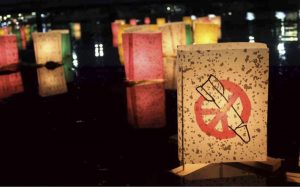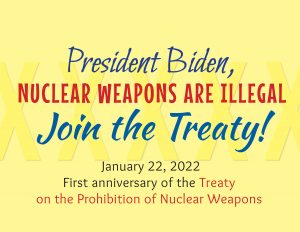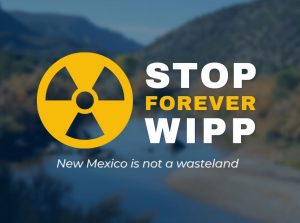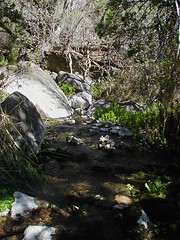UN Adopts Treaty for a World Without Nuclear Weapons
![]() Our world is different today as a result of a historic vote on Friday, July 7th at the United Nations when 122 State Parties, or countries, voted yes to adopt the 10-page Treaty on the Prohibition of Nuclear Weapons. It comprehensively prohibits nuclear weapons, leading towards their eventual elimination. It stigmatizes nuclear weapons in a fashion similar to the international treaties that prohibit chemical weapons, biological weapons, anti-personnel landmines and cluster munitions. http://www.undocs.org/en/a/conf.229/2017/L.3/Rev.1
Our world is different today as a result of a historic vote on Friday, July 7th at the United Nations when 122 State Parties, or countries, voted yes to adopt the 10-page Treaty on the Prohibition of Nuclear Weapons. It comprehensively prohibits nuclear weapons, leading towards their eventual elimination. It stigmatizes nuclear weapons in a fashion similar to the international treaties that prohibit chemical weapons, biological weapons, anti-personnel landmines and cluster munitions. http://www.undocs.org/en/a/conf.229/2017/L.3/Rev.1
The Treaty is based on international humanitarian law. It prohibits State Parties from developing, testing, producing, manufacturing, transferring, possessing, stockpiling, using or threatening to use nuclear weapons. It also prohibits State Parties from assisting, encouraging or inducing anyone to engage in any of those activities. Further, States must not allow nuclear weapons to be stationed or deployed within their borders. For more information, please visit the International Campaign to Abolish Nuclear Weapons at http://www.icanw.org/ and Reaching Critical Will, a project of the Women’s International League for Peace and Freedom (WILPF), at http://reachingcriticalwill.org/
Non-governmental organizations and individuals around the world have been working since the summer of 1945 to ban nuclear weapons when the United States first tested an atomic plutonium bomb at the Trinity Site in New Mexico, and used atomic bombs on Hiroshima and Nagasaki, Japan. The entire nuclear cycle, from uranium mining and milling; to research, development and testing; to the mountains of pollution and waste created with no place to go, results in catastrophic consequences.
 In April, the International Red Cross and Red Crescent Movement met in Nagasaki to reaffirm their long opposition to nuclear weapons and work for their elimination. They wrote, “Achieving a world without nuclear weapons is an obligation to future generations and imperative to preserve our common humanity. Weapons that risk catastrophic humanitarian consequences cannot possibly be viewed as providing peoples’ security. Protecting humanity requires courage, commitment and concerted action: it is time to put humanity first by prohibiting and completely eliminating nuclear weapons.” https://www.icrc.org/en/document/never-again-nagasaki-must-be-last-atomic-bombing
In April, the International Red Cross and Red Crescent Movement met in Nagasaki to reaffirm their long opposition to nuclear weapons and work for their elimination. They wrote, “Achieving a world without nuclear weapons is an obligation to future generations and imperative to preserve our common humanity. Weapons that risk catastrophic humanitarian consequences cannot possibly be viewed as providing peoples’ security. Protecting humanity requires courage, commitment and concerted action: it is time to put humanity first by prohibiting and completely eliminating nuclear weapons.” https://www.icrc.org/en/document/never-again-nagasaki-must-be-last-atomic-bombing
Their appeal came true despite the 69 State Parties, including the United States, who did not participate in the negotiations or the vote. In the end, The Netherlands, a NATO member, voted no and Singapore abstained.
On September 20, 2017, the State Parties, including the United States, will have their first opportunity to sign the Treaty during the annual United Nations General Assembly in New York City. http://thebulletin.org/nuclear-ban-treaty-missed-us-opportunity-can-be-redeemed-september10939 The Treaty is not yet in force. It will become international law ninety days after fifty State Parties sign and ratify it.
Now that the Treaty has been adopted, CCNS believes it is time for New Mexicans to discuss a collective future that is not dependent upon the nuclear weapons industry. How do we use the Treaty to create a sustainable, renewable, contamination-free future that supports life, well-being and community? Send us your comments and join the discussion on Facebook.
Tags: General Assembly of United Nations, Hiroshima, International Committee of the Red Cross, Japan, Nagasaki, new mexico, Singapore, stigmatizes nuclear weapons, The Netherlands, Treaty on the Prohibition of Nuclear Weapons, Trinity Site, United Nations
















Comments
No comments so far.